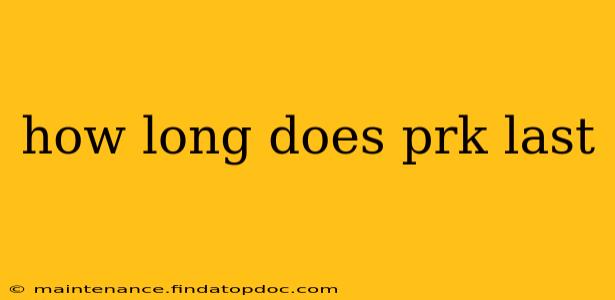Photorefractive keratectomy (PRK) is a laser eye surgery procedure designed to correct refractive errors like nearsightedness (myopia), farsightedness (hyperopia), and astigmatism. Many people choose PRK as an alternative to LASIK, particularly those with thinner corneas. But a common question is: how long does PRK last? The answer isn't a simple number, as it depends on several factors. This comprehensive guide will explore the longevity of PRK and address frequently asked questions.
How Long Does the PRK Procedure Itself Take?
Before diving into the longevity of vision correction, let's address the immediate timeframe. The PRK procedure itself is relatively quick, typically lasting 15-20 minutes per eye. This includes preparation, the laser treatment, and initial post-operative care. The entire appointment, including pre- and post-operative assessments, might take a few hours.
How Long Does It Take to Recover from PRK?
Recovery from PRK is a crucial factor influencing the overall experience. While vision improves steadily, the full recovery period can be several weeks, even up to a few months. Initial discomfort is common, and patients typically experience blurry vision, sensitivity to light, and dry eyes in the first few days. Full visual acuity can take several weeks or even months to achieve, varying greatly depending on the individual and the extent of the refractive correction.
What is the typical recovery timeline for PRK?
- Day 1-3: Significant discomfort, blurry vision, light sensitivity, and dry eyes are common.
- Week 1-2: Gradual improvement in vision, although blurry vision may still persist. Discomfort subsides significantly.
- Week 2-4: Continued improvement in vision; most patients can resume normal daily activities.
- Month 1-3: Vision continues to stabilize, with most individuals achieving near-optimal visual acuity. However, subtle improvements can occur even beyond this point.
How Long Does the Vision Correction from PRK Last?
This is the core question. While PRK offers excellent long-term vision correction for many, it's not a permanent solution. The lifespan of the correction depends on several factors:
- Age: As we age, our eyes naturally change, leading to presbyopia (difficulty focusing on near objects). This is independent of the PRK procedure and can affect vision clarity, even after successful correction.
- Pre-existing conditions: Certain underlying eye conditions can influence the longevity of the correction.
- Individual variation: Every individual's response to the procedure is unique, leading to variations in the duration of the corrective effect.
- Lifestyle factors: Exposure to UV light and trauma can also impact the long-term results.
Generally, many individuals maintain excellent vision correction from PRK for 5-10 years, with some experiencing benefits for longer periods. However, a gradual regression is possible over time, especially in individuals with higher degrees of refractive error.
Does PRK Need Touch-Up Surgery?
Many patients who undergo PRK maintain excellent vision for years, but it's essential to acknowledge the possibility of needing a touch-up procedure at some point. If your vision starts to regress significantly, your ophthalmologist might recommend a subsequent PRK procedure or another corrective option.
Is PRK More Permanent Than LASIK?
Both PRK and LASIK are effective laser vision correction procedures, but PRK is often considered to provide more stable, long-lasting results in the long run, though LASIK often provides faster recovery. However, neither procedure guarantees a lifetime of perfect vision.
What are the alternatives to PRK if I don't want surgery?
If you're considering PRK but are hesitant about surgery, explore alternative vision correction methods, including glasses or contact lenses. These offer immediate, non-surgical solutions but may not be as convenient or practical in the long term.
Conclusion
The duration of PRK's effects varies significantly depending on several factors. While many patients enjoy excellent vision correction for 5-10 years or more, individual experiences can differ. Regular follow-up appointments with your ophthalmologist are crucial to monitor your vision and address any concerns. Open communication with your eye doctor is paramount in ensuring you make the best decision for your individual needs and expectations.
